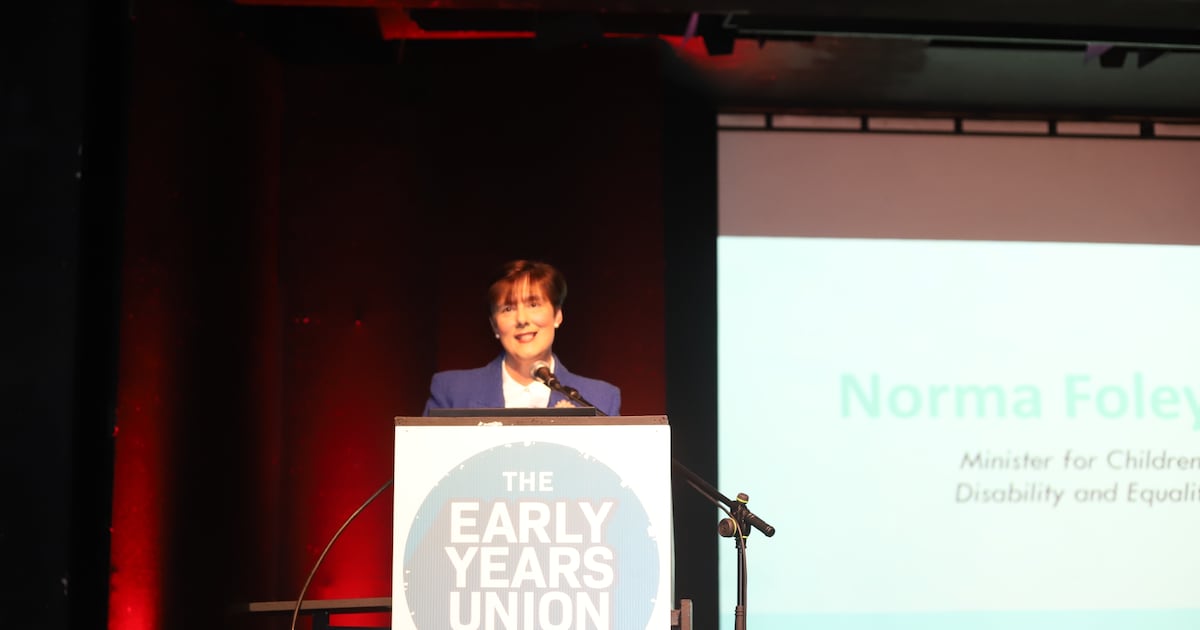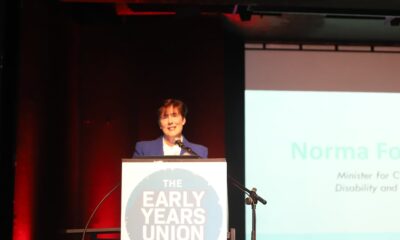Other News
Catherine Connolly ‘understands opportunity of Irish unity’, says Mary Lou McDonald
Other News
More than €4m in public childcare funding being lost because of pay deal delay

Read more on post.
More than €4 million in Government funding to the childcare sector is set to be returned due to a delay in ratifying an already-agreed 10 per cent pay increase for the more than 30,000 workers in the sector.
The money represents about 10 per cent of the €45 million in ring-fenced funding to support pay in the early years sector which was allocated in last year’s budget.
The funding year for the sector runs from September 1st and the money was to be allocated evenly across 52 weeks.
It means the failure to ratify the agreement reached by representatives of owners and staff at the start of the summer after a Joint Labour Committee (JLC) process, overseen by the Labour Court, is holding up the implementation of the increases and resulting in the loss of €865,000 in public funding per week.
Speaking at Siptu’s early years sector conference at Liberty Hall in Dublin on Saturday, Minister for Children, Disability and Equality Norma Foley said she wanted to see all of the money provided by Government to the sector reach it and was particularly anxious to see the pay and conditions of staff improve but “the JLC is an independent process and I have to respect that”.
She told delegates she hopes the process of implementing the deal would be completed “within weeks”.
Siptu’s Darragh O’Connor said the loss of funding had been caused by delays on the employer side in agreeing the deal. “It’s not the first time that has happened – the previous deal took over a year to conclude. We need these deals to be concluded in good time so educators don’t lose out like this.”
Ms Foley said the Government remains committed to the targets set out for the sector in its programme, including the reduction of fees to parents to €200 per month, but the scale of progress made in this budget would depend on the amount of funding made available to her department.
Negotiations are understood to be continuing between Ms Foley and Minister for Public Expenditure Jack Chambers, with one meeting having taken place last week and another scheduled for the coming days.
Ms Foley said she was pleased to see that supports introduced by the previous government meant many parents on low incomes were now paying rates at or below the OECD average for childcare but she was conscious that for many on middle and high incomes there were still instances of “very high fees”.
It was reported earlier this week in The Irish Times that the budget is likely contain measures intended to particularly help those families paying the highest amounts in fees, and Ms Foley also mentioned those with three or more children as being potentially among the most hard-pressed at present.
In addition, she said, “it is the intention that we drive forward with the public model while recognising the great service that is provided by those who are the private providers.”
Siptu’s Diane Jackson said the union wanted, among other things, to see the State’s first publicly operated early years service open next year. Its assistant general secretary, John King, said Ms Foley should spark a “Donogh O’Malley moment” by transforming access to early years the way her predecessor as minister for education had with secondary education in 1967.
She said the Government continues to see public-run services as part of the anticipated future mix and as a tool to address geographical shortages but she could not put a time frame on any roll-out.
Also at the event, her predecessor as minister for children, Roderic O’Gorman, urged her to move forward immediately, saying: “I know from experience that if you want to see results in years three, four and five, you have to act in year one.”
Other News
Thousands left without power in Zaporizhzhia as Russian drone attacks cause damage
Read more on post.

ADVERTISEMENT
Russian attacks in Zaporizhzhia on Saturday left around 9,000 households without electricity, though by morning, energy crews had managed to restore almost all power, local officials in the Ukrainian city said.
According to the Zaporizhzhia Regional Military Administration, a store, ten retail outlets, two apartment buildings, and several non-residential premises were damaged in the drone attacks.
Destruction also affected a site near the bus station, which had already been hit on 10 August by guided bombs. At that time, 80% of the building was destroyed.
Its windows were boarded up with OSB sheets, on which a local artist had painted a mural. After the latest nighttime strike, the artwork was also damaged.
On Saturday morning, employees at one of the hardest-hit sites near the bus station were carrying out dozens of boxes with food, drinks, and other goods.
Some reported that a Russian Shahed drone struck the building overnnight, when staff were conducting inventory.
One of the employees, Volodymyr, said that after hearing the first explosion, they ran to a modular shelter, claiming that this quick reaction saved their lives.
Nearby, kiosk worker Hanna was clearing broken glass and twisted metal. She noted that this neighbourhood had already been shelled once before.
Fourth day of blackout at Zaporizhia nuclear plant
Saturday’s attacks came as Ukraine’s Zaporizhzhia nuclear plant has been off-grid for four consecutive days, its longest blackout to date.
Blackouts at the plant have been frequent since Russia seized the Zaporizhzhia plant in 2022, due to its proximity to the front line, but experts are warning that the current blackout heightens the risk of a malfunction.
The Zaporizhzhia nuclear power plant in the middle of the fighting in Ukraine was temporarily knocked offline Thursday because of fire damage to a transmission line, causing a blackout across the region and heightening fears of a catastrophe in a country still haunted by the Chernobyl disaster.
The complex, Europe’s largest nuclear plant, has been occupied by Russian forces and run by Ukrainian workers since the early days of the 6-month-old war.
Ukraine alleges Russia is essentially holding the plant hostage, storing weapons there, and launching attacks from around it, while Moscow accuses Ukraine of recklessly firing on the facility.
The plant’s emergency backup diesel generators had to be turned on in order to provide the electricity required to operate the plant, according to Ukrainian President Volodymyr Zelenskyy, who blamed Russia’s relentless attacks.
Other News
Government may increase allowances for asylum seekers who leave voluntarily

Read more on post.
Increasing allowances for asylum seekers who leave the country voluntarily could be a way to make the immigration system more efficient, Paschal Donohoe has said.
The Finance Minister was commenting after it was reported on Saturday that Justice Minister Jim O’Callaghan is to increase the allowance to €2,500 for individuals and €10,000 for families. Mr Donohoe was asked about the report in the Irish Times as he joined Fine Gael colleagues on Saturday at a conference in Carlow the party hosted for small and medium-sized businesses.
“I understand Minister O’Callaghan is looking at this at the moment,” he said. “We know that deportations do play an important role in relation to having a fair and efficient migration system in place.
“But it’s also costly, it also takes a lot of time to actually make them happen. I understand what Minister O’Callaghan is doing is looking at is there other ways in which we could ensure that those who will be leaving Ireland at some point in the future, do so in a more timely and a more efficient way.
“This is a decision that he’s able to make inside his own budget. We, overall, as a Government believe that having an open economy and an open society is enormously positive.
“It’s really important for the growth of our economy, really important for our society to continue to grow, but, at the same time, we do need to have migration rules that are clear and well implemented, and this appears to be a way in which that can be further delivered.”
Minister Donohoe also insisted the Government had not made any decision on changing the income threshold criteria for carer’s allowance. The Irish Independent reported on Saturday that the reform of the carer’s allowance is set to be a key plank of the budget, with the move expected to result in thousands more people qualifying for the support.
“I can tell you no decisions have been made with regard to the budget,” he said. “And Minister (Jack) Chambers as Minister for Public Expenditure is now engaged in negotiations with all ministers in relation to specific matters, but how we support carers has always been a key focus of budgets that have been done.”
Join our Dublin Live breaking news service on WhatsApp. Click this link to receive your daily dose of Dublin Live content. We also treat our community members to special offers, promotions, and adverts from us and our partners. If you don’t like our community, you can check out any time you like. If you’re curious, you can read our Privacy Notice.
For all the latest news from Dublin and surrounding areas visit our homepage.
-
Politics4 days ago
European Parliament snubs Orbán with vote to shield Italian MEP from Hungarian arrest
-
Culture2 months ago
Fatal, flashy and indecent – the movies of Adrian Lyne revisited
-
Culture3 weeks ago
Life, loss, fame & family – the IFI Documentary Festival in focus
-
Environment1 week ago
Key oceans treaty crosses threshold to come into force
-
Health5 days ago
EU renews support for WHO’s Universal Health Coverage Partnership
-
Culture1 week ago
Farewell, Sundance – how Robert Redford changed cinema forever
-
Culture5 days ago
Twilight at 20: the many afterlives of Stephenie Meyer’s vampires
-
Culture4 weeks ago
What is KPop Demon Hunters, and why is everyone talking about it?












































